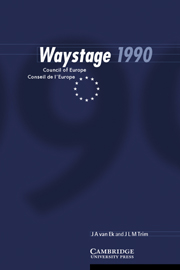Book contents
- Frontmatter
- Contents
- Preface
- Introduction
- 1 The objective: description
- 2 Components of the specification
- 3 Language functions
- 4 General notions
- 5 Themes and specific notions
- 6 Dealing with texts: reading and listening
- 7 Writing
- 8 Sociocultural competence
- 9 Verbal exchange patterns
- 10 Compensation strategies
- 11 Learning to learn
- 12 Degree of skill
- APPENDICES
- Frontmatter
- Contents
- Preface
- Introduction
- 1 The objective: description
- 2 Components of the specification
- 3 Language functions
- 4 General notions
- 5 Themes and specific notions
- 6 Dealing with texts: reading and listening
- 7 Writing
- 8 Sociocultural competence
- 9 Verbal exchange patterns
- 10 Compensation strategies
- 11 Learning to learn
- 12 Degree of skill
- APPENDICES
Summary
Waystage 1990 is the latest, thoroughly revised, extended, corrected and reset version of Waystage: an intermediary objective below Threshold Level in a European unit/credit system of modern language learning by adults by J. A. van Ek and L. G. Alexander, in association with M. A. Fitzpatrick. This work was first published by the Council of Europe in 1977 and republished in 1980 by Pergamon Press for and on behalf of the Council of Europe under the title Waystage English.
Waystage was originally conceived in the context of the preparation for the broadcast-led Anglo-German multimedia co-production Follow Me. Overall, Follow Me was originally planned as a two-year English language course for use by the DVV (Deutscher Volkshochschulverband) in its adult education classes. The final objective was set as The Threshold Level, first produced for the Council of Europe by Dr J. A. van Ek, which sets down in specific detail, exemplified for English, what a language user needs to do by means of language in order to ‘communicate socially with people from other countries, exchanging information and opinion on everyday matters in a relatively straightforward way, and to conduct the necessary business of everyday living when abroad with a reasonable degree of independence’ (preface to Threshold, CUP 1998). An experiment conducted in Vienna Volkshochschulen showed that the full attainment of this objective under the normal conditions of adult education would take a full two years.
- Type
- Chapter
- Information
- Waystage 1990Council of Europe Conseil de l'Europe, pp. 1 - 3Publisher: Cambridge University PressPrint publication year: 1999



